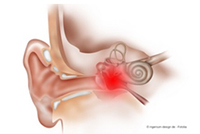Aching ears: Why they're so sensitive and vulnerable

Earache is often very unpleasant. Infection of the middle ear is often the cause. An expert from the Medical Center - University of Freiburg explains what can lie behind it, and when a doctor should examine the ears.
Middle ear inflammation, or in Latin otitis media, is the most common ear disease in children up to the age of six. Smaller children often then grasp the affected ear, are whiny and seem altogether ill. The pains increase in the evening or at night. "Categorically, all earaches that persist for more than two days, or during which further symptoms such as hearing loss, fever or other signs of illness appear, should be clarified by a doctor," explains Professor Dr. Dr. h.c. mult. Roland Laszig Medical Director of the Department of Oto-Rhino-Laryngology at the Medical Center - University of Freiburg. As a rule, middle ear infection is preceded by a cold, flu or sinusitis. The inflammation usually then begins suddenly and manifests itself via pulsating pain and an unpleasant feeling of pressure in the ear.
Acute middle ear inflammation usually heals after a few days with no consequences. Small injuries to the eardrum also heal again within one to two weeks. However, medical observation is important: "A persistent infection in the middle ear can permanently damage the hearing and should therefore be urgently treated," says Professor Laszig. In small children, childhood polyps, called adenoids, are often the cause of recurrent acute middle ear inflammations.
What helps with middle ear infection
Rest and plenty of sleep help to accelerate the healing process in middle ear inflammation. Pain and fever can be relieved with antipyretic painkillers. Antibiotics are mainly used with children under six months old. Decongestant nose drops are used for better ventilation when the middle ear infection is the result of a cold. "Nasal drops or sprays should not be used for more than a week without consulting the doctor, as otherwise the nose will no longer be able to decongest without these remedies," advises Professor Laszig.
A little bag of onions is the best known home remedy for earache. The essential oils in the onion have an antibacterial, metabolism-stimulating and expectorant effect. Patients should also make sure that during a middle ear inflammation no water enters the ears while showering or bathing. If the adenoids in the nasopharynx are a contributory cause, they should be removed under anesthesia.
Earache: What lies behind it?
The ears are particularly sensitive to pain. The fine skin that surrounds the bones and cartilage is crossed by numerous nerves. Diseases of one or both ears are therefore always associated with pain.
"Important facial nerves run in the area of the ear. Various ailments can thus affect the nerves and muscle strands in the ears," says Professor Laszig. "If you have an earache, you might also need a neurologist, a dentist or an orthopedist."
Tooth and jaw problems are often responsible for earaches. Damage or malfunction in the cervical spine can also be manifested by earache.
Occasionally, when earache occurs without an identifiable physical cause, the psyche is signalling. Depressive illnesses sometimes also manifest in physical complaints such as dizziness, ringing in the ears and earache.
Back